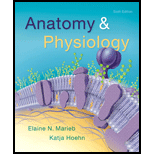
Concept explainers
The large onion-shaped receptors that are found deep in the dermis and in subcutaneous tissue and that respond to deep pressure are (b) tactile discs, (b) lamellar corpuscles, (c) free nerve endings, (b) muscle spindles.
To determine:
The name of onion-shaped receptor found in dermis and subcutaneous tissue which helps in responding to deep pressure is:
Tactile discs
Lamellar corpuscles
Free nerve endings
Muscle spindles
Answer to Problem 1MC
Correct answer:
(b) Lamellar corpuscles are the onion-shaped receptors found in dermis.
Explanation for the correct answer:
Option (b) is given as lamellar corpuscles are onion-shaped receptor found in dermis and subcutaneous tissue which helps in responding to deep pressure. Lamellar corpuscles are one of the four major types of mechanoreceptor cell in glabrous (hairless) mammalian skin. They respond to the mechanical stresses such as pressure and the vibrations. These receptors are found in the dermis and the subcutaneous layers. They are the largest corpuscle receptors. Hence, option (b) is a correct option.
Explanation of Solution
Explanation for the incorrect answers:
Option (a) is given as tactile discs. Tactile receptors are a type of mechanoreceptors that are found on the nerve ending and can sense even very mild touch. They are located in the skin and are predominant in sensitive areas such as lips and tips of fingers. Hence, option (a) is an incorrect option.
Option (c) is given as free nerve endings. The free nerve endings are present in the skin. They help in the reception of the pain, itching, and the changes in the temperature. The free nerve endings are the uncovered nerve endings and they are unspecialized. Hence, option (c) is an incorrect option.
Option (d) is given as muscle spindles. The muscle spindles are the sensory fibers present in the muscles detecting changes in the muscle length. They are not present in the dermis. Hence, option (d) is an incorrect option.
Therefore, it is concluded lamellar corpuscles are the onion-shaped receptors found deep in dermis and subcutaneous tissue which helps in responding to deep pressure..
Want to see more full solutions like this?
Chapter 13 Solutions
Anatomy & Physiology (6th Edition)
- please fill in the empty sports, thank you!arrow_forwardIn one paragraph show how atoms and they're structure are related to the structure of dna and proteins. Talk about what atoms are. what they're made of, why chemical bonding is important to DNA?arrow_forwardWhat are the structure and properties of atoms and chemical bonds (especially how they relate to DNA and proteins).arrow_forward
- The Sentinel Cell: Nature’s Answer to Cancer?arrow_forwardMolecular Biology Question You are working to characterize a novel protein in mice. Analysis shows that high levels of the primary transcript that codes for this protein are found in tissue from the brain, muscle, liver, and pancreas. However, an antibody that recognizes the C-terminal portion of the protein indicates that the protein is present in brain, muscle, and liver, but not in the pancreas. What is the most likely explanation for this result?arrow_forwardMolecular Biology Explain/discuss how “slow stop” and “quick/fast stop” mutants wereused to identify different protein involved in DNA replication in E. coli.arrow_forward
- Molecular Biology Question A gene that codes for a protein was removed from a eukaryotic cell and inserted into a prokaryotic cell. Although the gene was successfully transcribed and translated, it produced a different protein than it produced in the eukaryotic cell. What is the most likely explanation?arrow_forwardMolecular Biology LIST three characteristics of origins of replicationarrow_forwardMolecular Biology Question Please help. Thank you For E coli DNA polymerase III, give the structure and function of the b-clamp sub-complex. Describe how the structure of this sub-complex is important for it’s function.arrow_forward
 Human Physiology: From Cells to Systems (MindTap ...BiologyISBN:9781285866932Author:Lauralee SherwoodPublisher:Cengage Learning
Human Physiology: From Cells to Systems (MindTap ...BiologyISBN:9781285866932Author:Lauralee SherwoodPublisher:Cengage Learning Human Biology (MindTap Course List)BiologyISBN:9781305112100Author:Cecie Starr, Beverly McMillanPublisher:Cengage Learning
Human Biology (MindTap Course List)BiologyISBN:9781305112100Author:Cecie Starr, Beverly McMillanPublisher:Cengage Learning Biology 2eBiologyISBN:9781947172517Author:Matthew Douglas, Jung Choi, Mary Ann ClarkPublisher:OpenStaxEssentials of Pharmacology for Health ProfessionsNursingISBN:9781305441620Author:WOODROWPublisher:Cengage
Biology 2eBiologyISBN:9781947172517Author:Matthew Douglas, Jung Choi, Mary Ann ClarkPublisher:OpenStaxEssentials of Pharmacology for Health ProfessionsNursingISBN:9781305441620Author:WOODROWPublisher:Cengage Comprehensive Medical Assisting: Administrative a...NursingISBN:9781305964792Author:Wilburta Q. Lindh, Carol D. Tamparo, Barbara M. Dahl, Julie Morris, Cindy CorreaPublisher:Cengage Learning
Comprehensive Medical Assisting: Administrative a...NursingISBN:9781305964792Author:Wilburta Q. Lindh, Carol D. Tamparo, Barbara M. Dahl, Julie Morris, Cindy CorreaPublisher:Cengage Learning





